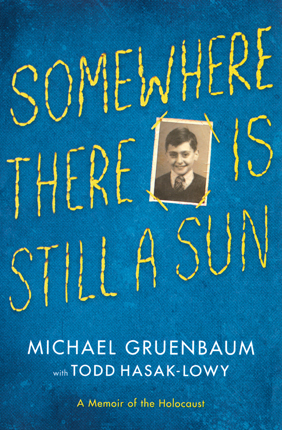Full Text Reviews: Booklist - 06/01/2015 As the Nazis march through Prague, nine-year-old Michael “Misha” Gruenbaum witnesses a couple jump to their deaths from a balcony and wonders, “did they know something the rest of us don’t?” Misha also can’t understand why his father is later taken by SS officers, only to be returned in a coffin. The bulk of this memoir, however, focuses on the two-and-a-half years he, his mother, and older sister spent in the Terezin concentration camp. First-person narration lends an immediacy and innocence to the story, as Misha doesn’t always comprehend the significance of events. For instance, he relishes playing soccer with new friends in Terezin, but when these friends are transported “east,” he only later realizes they had been sent to Auschwitz and the gas chamber. With the help of 20-year-old Franta, a father figure to the boys, Misha learns the strength it takes to survive. The Holocaust’s horrors are handled delicately for middle-grade readers but never detract from the truth. Photographs and letters add to the memoir’s efficacy and poignancy. - Copyright 2015 Booklist. School Library Journal - 07/01/2015 Gr 5–8—Michael (Misha) Gruenbaum lived an untroubled existence in Prague until the Nazis invaded in 1939, and he documents his life between the ages of nine and 15 in this poignant memoir. Misha's family was sent to the ghetto, where new and oppressive rules were imposed nearly every day. There, his father was arrested and later was reported to have died of kidney failure. Along with his mother and his sister, Marietta, Misha was eventually sent to the concentration camp Terezin, where his experiences ran the gamut, from the exciting and even enjoyable (staging musicals for the Red Cross) to the horrific (standing in freezing weather for hours for a population count). Eventually, transports to "the East" (Auschwitz-Birkenau) began. Young Misha's narration sets this Holocaust memoir apart from others. Initially unaware of the dark implications of the events, Misha adapted to camp life, playing soccer and making new friends, until he could no longer ignore the truth. His innocence contrasts with what readers (and the adults around Misha) know is going on, which creates a foreboding tone. The use of present-tense narration contributes to the urgency of the narration, and Misha's sense of fairness and his unfailing faith that things will improve will resonate with students. Some fictionalizing occurs: coauthor Hasak-Lowy explains in an afterward that he had to "fill in gaps" in the book, such as writing the dialogue. VERDICT An excellent introduction to the Holocaust for those who may not be ready for every grim detail.—Katherine Koenig, The Ellis School, PA - Copyright 2015 Publishers Weekly, Library Journal and/or School Library Journal used with permission. Loading...
|



